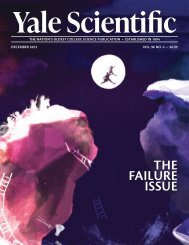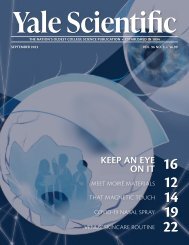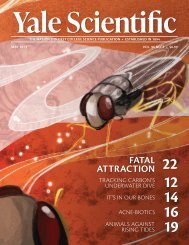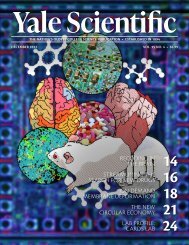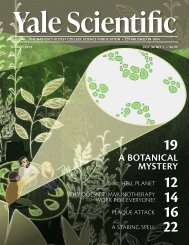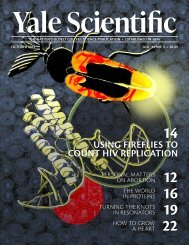YSM Issue 95.1
Create successful ePaper yourself
Turn your PDF publications into a flip-book with our unique Google optimized e-Paper software.
ALUMNI PROFILE
JAMES DIAO
MY ’18
BY YUSUF RASHEED
Growing up next to the biggest medical center in the world,
James Diao YC ’18 was meant to be a doctor. A third-year
medical school student at Harvard Medical School (HMS)
and MIT, Diao was recently awarded the Churchill Scholarship to
do a year of master’s study in science policy at the University of
Cambridge for the 2022-23 academic year. With this scholarship,
he plans to take a deep dive into understanding the regulation of
healthcare technology and the efficacy of clinical algorithms
across diverse populations.
Diao’s initial interest in medicine and research stems back
to his hometown of Sugar Land, Texas, where he shadowed
Rachel Rau, a pediatric oncologist at the Texas Medical Center
in high school. “I learned a lot about science. I learned a lot
about patient care. I thought her job was the coolest job in the
world,” Diao said. At Yale, he continued to shadow clinicians
at Haven Free Clinic and became a Peer Counselor for Yale’s
anonymous and confidential hotline, Walden Peer Counseling.
Now, he’s spending time with patients in his core rotations.
In addition to his clinical experience, Diao has also spent a lot of
time on research. In April of 2020, he started studying the misuse
of race in kidney function tests with Arjun Manrai at the HMS
Department of Biomedical Informatics. Diao’s idea to pursue this
project was a bit spontaneous. “My mentor and I had previously
worked on equity and representation for cardiovascular genetics,
but kidney disease wasn’t on our radar
at all. It wasn’t until I learned about
the issue on Twitter that I began
diving into the literature and
thinking about ways to
contribute,” Diao said.
The “issue” Diao
had stumbled upon
was related to the
glomerular filtration
rate (GFR). GFR
measures how well
a person’s kidneys
can filter substances
from their blood, which
is essential in the early
detection of potential
kidney disease. The current
test to measure someone’s GFR is
an equation that involves several variables,
including age, sex, and race, with higher results indicating
healthy kidney function. “The main issue is [with] the race
and ethnicity component. If you’re Black, your number will
be assigned 16% higher,” Diao said. As a result, Black patients
with higher GFR numbers may have less access to specialist
www.yalescientific.org
PHOTO COURTESY OF JAMES DIAO VIA LAUREN CHONG
care, kidney transplants, and coverage by Medicare. Diao’s
research quantified the effect of including and removing
race from the equation, and he found that up to one million
Black Americans may receive unequal
kidney care due to their race.
When the race variable was
eliminated, he found that
access to diagnosis and
specialist care increased
for Black Americans.
Race-free equations could
also achieve the same
performance metrics
as the original ones.
In October of 2021, the
National Kidney Foundation
and the American Society of
Nephrology officially released
national recommendations supporting
a new race-free equation, citing Diao’s research.
During Diao’s first year of medical school, he joined the
machine learning team at tech startup PathAI, where he
worked on deep learning models in pathology. He then
joined Apple’s Motion Health team, where he worked on
studies to predict cardiovascular risk for the Apple Watch
using accelerometer data from consumer wearables. Diao
was named to the 2022 Forbes “30 Under 30” List for his
work and received the prestigious Paul & Daisy Soros
Fellowship in their 2021 cohort.
When he’s not conducting research, Diao is probably
ballroom dancing. This hobby started in college
when he searched for activities to get involved in.
“Ballroom was one cool [club] where they don’t
care if you’re new to it all”, Diao said. “You don’t
need to have any experience, you just show up, and
their whole thing is ‘We’ll teach you!’”
As Diao finishes medical school and approaches
the next step of his career, he hopes to continue
tackling systemic problems in medicine. He wants
to become a professor and investigator, studying
the performance and equity of medical technology
and translating this research to the realms of patient care,
company advising, and clinical trials.
Diao advises undergraduates to remember that they are only
at the very start of their careers. “There will be so much time
to double down on whatever ends up being your life’s work,”
Diao said. “I think there’s a lot of value in exploring early and
exploring all the different paths that are available to you and not
committing so early.” ■
PHOTO COURTESY OF JAMES DIAO VIA LAUREN CHONG
March 2022 Yale Scientific Magazine 35




